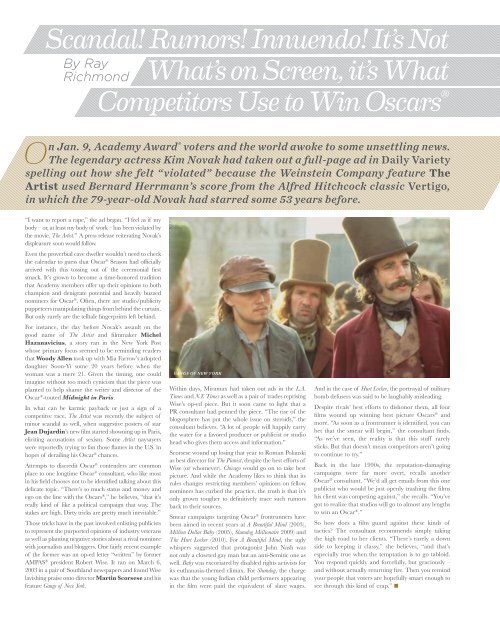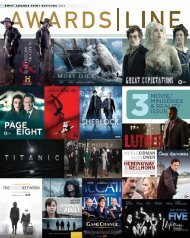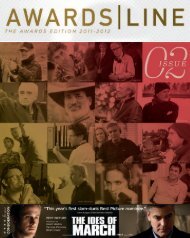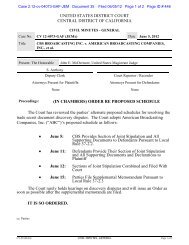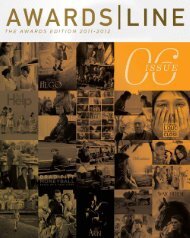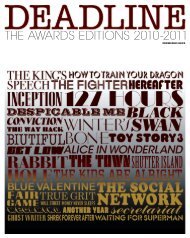THE AWARDS EDITION 2011-2012
THE AWARDS EDITION 2011-2012
THE AWARDS EDITION 2011-2012
- No tags were found...
You also want an ePaper? Increase the reach of your titles
YUMPU automatically turns print PDFs into web optimized ePapers that Google loves.
Scandal! Rumors! Innuendo! It’s NotBy RayRichmondWhat’s on Screen, it’s WhatCompetitors Use to Win Oscars ®On Jan. 9, Academy Award ® voters and the world awoke to some unsettling news.The legendary actress Kim Novak had taken out a full-page ad in Daily Varietyspelling out how she felt “violated” because the Weinstein Company feature TheArtist used Bernard Herrmann’s score from the Alfred Hitchcock classic Vertigo,in which the 79-year-old Novak had starred some 53 years before.“I want to report a rape,” the ad began. “I feel as if mybody – or, at least my body of work – has been violated bythe movie, The Artist.” A press release reiterating Novak’sdispleasure soon would follow.Even the proverbial cave dweller wouldn’t need to checkthe calendar to guess that Oscar ® Season had officiallyarrived with this tossing out of the ceremonial firstsmack. It’s grown to become a time-honored traditionthat Academy members offer up their opinions to bothchampion and denigrate potential and heavily buzzednominees for Oscar ® . Often, there are studio/publicitypuppeteers manipulating things from behind the curtain.But only rarely are the telltale fingerprints left behind.For instance, the day before Novak’s assault on thegood name of The Artist and filmmaker MichelHazanavicius, a story ran in the New York Postwhose primary focus seemed to be reminding readersthat Woody Allen took up with Mia Farrow’s adopteddaughter Soon-Yi some 20 years before when thewoman was a mere 21. Given the timing, one couldimagine without too much cynicism that the piece wasplanted to help shame the writer and director of theOscar ® -touted Midnight in Paris.In what can be karmic payback or just a sign of acompetitve race, The Artist was recently the subject ofminor scandal as well, when suggestive posters of starJean Dujardin’s new film started showning up in Paris,eliciting accusations of sexism. Some Artist naysayerswere reportedly trying to fan those flames in the U.S. inhopes of derailing his Oscar ® chances.Attempts to discredit Oscar ® contenders are commonplace to one longtime Oscar ® consultant, who like mostin his field chooses not to be identified talking about thisdelicate topic. “There’s so much status and money andego on the line with the Oscars ® ,” he believes, “that it’sreally kind of like a political campaign that way. Thestakes are high. Dirty tricks are pretty much inevitable.”Those tricks have in the past involved enlisting publiciststo represent the purported opinions of industry veteransas well as planting negative stories about a rival nomineewith journalists and bloggers. One fairly recent exampleof the former was an op-ed letter “written” by formerAMPAS ® president Robert Wise. It ran on March 6,2003 in a pair of Southland newspapers and found Wiselavishing praise onto director Martin Scorsese and hisfeature Gangs of New York.Gangs of new yorkWithin days, Miramax had taken out ads in the L.A.Times and N.Y. Times as well as a pair of trades reprisingWise’s op-ed piece. But it soon came to light that aPR consultant had penned the piece. “The rise of theblogosphere has put the whole issue on steroids,” theconsultant believes. “A lot of people will happily carrythe water for a favored producer or publicist or studiohead who gives them access and information.”Scorsese wound up losing that year to Roman Polanskias best director for The Pianist, despite the best efforts ofWise (or whomever). Chicago would go on to take bestpicture. And while the Academy likes to think that itsrules changes restricting members’ opinions on fellownominees has curbed the practice, the truth is that it’sonly grown tougher to definitively trace such rumorsback to their sources.Smear campaigns targeting Oscar ® frontrunners havebeen aimed in recent years at A Beautiful Mind (2003),Million Dollar Baby (2005), Slumdog Millionaire 2009) andThe Hurt Locker (2010). For A Beautiful Mind, the uglywhispers suggested that protagonist John Nash wasnot only a closeted gay man but an anti-Semitic one aswell. Baby was excoriated by disabled rights activists forits euthanasia-themed climax. For Slumdog, the chargewas that the young Indian child performers appearingin the film were paid the equivalent of slave wages.And in the case of Hurt Locker, the portrayal of militarybomb defusers was said to be laughably misleading.Despite rivals’ best efforts to dishonor them, all fourfilms wound up winning best picture Oscars ® andmore. “As soon as a frontrunner is identified, you canbet that the smear will begin,” the consultant finds.“As we’ve seen, the reality is that this stuff rarelysticks. But that doesn’t mean competitors aren’t goingto continue to try.”Back in the late 1990s, the reputation-damagingcampaigns were far more overt, recalls anotherOscar ® consultant. “We’d all get emails from this onepublicist who would be just openly trashing the filmshis client was competing against,” she recalls. “You’vegot to realize that studios will go to almost any lengthsto win an Oscar ® .”So how does a film guard against these kinds oftactics? The consultant recommends simply takingthe high road to her clients. “There’s rarely a downside to keeping it classy,” she believes, “and that’sespecially true when the temptation is to go tabloid.You respond quickly and forcefully, but graciously –and without actually returning fire. Then you remindyour people that voters are hopefully smart enough tosee through this kind of crap.” •


